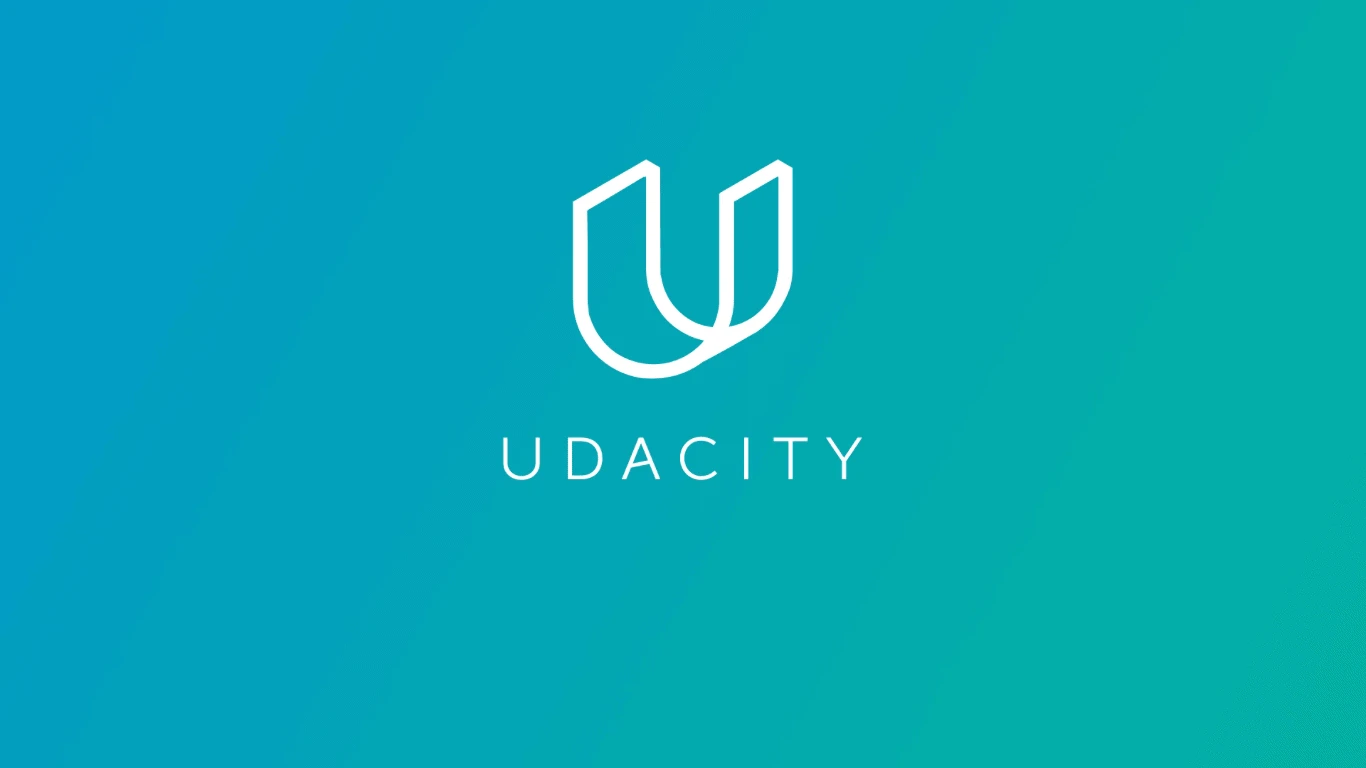- Best EdX Criminology Courses Guide - August 16, 2022
- Best EdX Design Courses That Could Help Jumpstart Your Career - August 16, 2022
- EdX vs Pluralsight - August 16, 2022
I’ve seen the headlines, and maybe you have too: automation is making jobs in data science obsolete. But if you’ve been passionate about IT and data science fields, the news is that those headlines don’t visualize the full job market. If anything, these fields will continue to evolve. And instead of taking time and paying for full degree programs, many students are flocking to learning platforms like Udacity and Datacamp.
While it’s true that AI is changing how we look at everything from digital marketing to full-stack development, what’s also true is that specialists will continue to be needed. Professionals are going back for training to understand advancements in operating systems, coding, and technology.
What’s happening is not bad news, but rather quite exciting. Fields like cybersecurity are needed more than ever. Blockchain technology is increasing in demand. Product design and leadership are adapting to an ever-evolving market.
To keep up with those changes, many are opting for Udacity and Datacamp, which offer self-paced and flexible learning. But which of these two platforms is worth your time and money?
Bottom Line Up Front Summary: Udacity is the superior option. While both Udacity and Datacamp offer courses in data science and tech, Udacity’s courses provide more personalized support. Course content goes into greater depth, the projects are more innovative and student support is superior. Sign up for Udacity Here (or check out Datacamp here).
Master real, in-demand tech skills from home with Udacity’s 100% online learning platform. Stay ahead of the curve and get the skills you’ll need for the jobs of the future.
Main Differences between Udacity vs Datacamp:
- Udacity offers nano degrees, whereas Datacamp provides a la carte course selection
- Udacity provides personalized project feedback, whereas Datacamp provides automated feedback
- Udacity focuses on more in-depth skills, whereas Datacamp teaches more technical skills
- Udacity offers a 2-day refund, whereas Datacamp doesn’t offer refunds (but is cheaper)
Company History and Mission
A company’s history and mission tell me a few things. It tells me how much experience they have with distance education, but also the general thought behind the platform. With Udacity and Datacamp, I wanted to see who they were trying to appeal to, and their main goals for their course offerings.
Udacity

Udacity is an online platform offering a plethora of courses in data science and technology. But it stands apart from many of its competitors with both its history and connections. Developed in 2011 as an offshoot of free courses then offered by Stanford University, Udacity is supported through Charles Rivers Ventures. By 2014, Udacity shifted its focus from single courses to nano degrees, which remain the spotlight for Udacity.
It was in that same year that the Georgia Institute of Technology added a master’s program through Udacity. In its history, Udacity has offered scholarships and had some interesting connections with colleges and tech companies. Its mission is to “train the world’s workforce” for “careers of the future.”
Datacamp
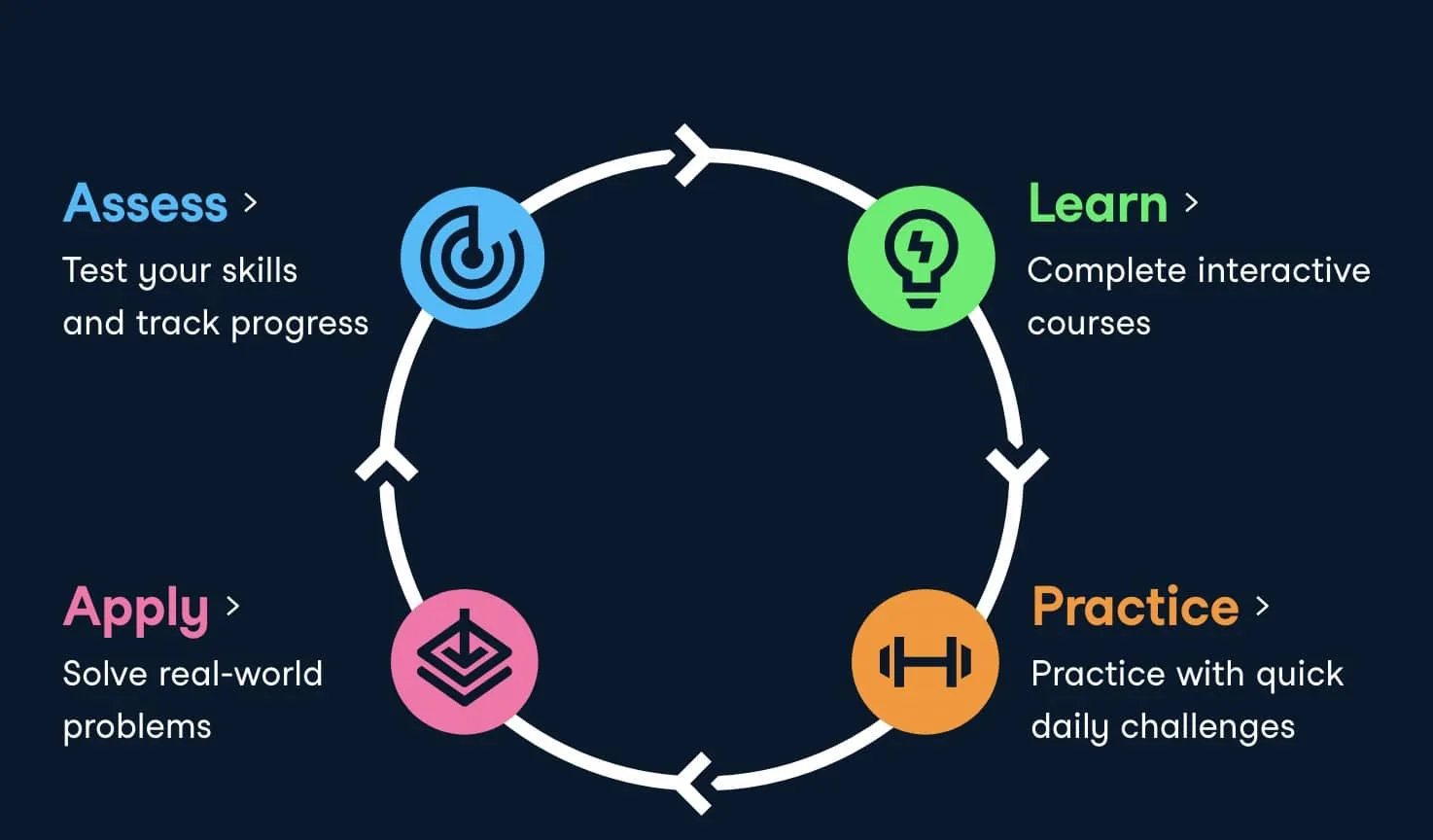
Datacamp launched just a few years after Udacity, in 2013. The New York-based company has some similarities in its mission statement. Their goal is to offer data courses to a wider range of learners, with a focus on keeping up to date on technology and business practices.
While Udacity provides scholarships, Datacamp provides free Bootcamp to students in need. I noticed a focus on workforce training, especially for Fortune 1000 companies.
Winner: Udacity
Datacamp has a bit less information on its company history. Both Datacamp and Udacity are for-profit, open-source educational platforms with a focus on technology, coding, and data courses. While their missions are similar, I like the added transparency and information about the team behind Udacity a bit more.
Pricing
Udacity and Datacamp are not meant to substitute for any official degree or professional certification programs. I outline these important details under my frequently asked questions section. Neither Udacity nor Datacamp guarantees job or employment improvement, but pricing is still important.
Udacity
Udacity has several free courses, as well as single paid courses and, of course, nano degrees. They also have a separate branch of executive programs. I like that they have all of these different options, but it can be confusing if you’re starting to look. Check out the table below to see how these different course options are priced, and their purpose.
| Course Type | Description | Price |
| Single Course | A single course usually focuses on a narrow topic or skill set. It may cover basic foundations, such as Java. These courses are part of units in Nanodegrees. The purpose of this is a lower cost, shorter time commitment, and narrower focus. | Monthly Subscription –
$399/ month |
| Executive Program | These are designed for business leaders and training. Compared with Udacity’s nano degrees, executive programs focus more on strategy and integration with business leadership. | $1599 (for Data Science for Business)
If not completed within the allotted time (2 months), you’ll be charged $399 a month for every month after |
| Nanodegree | Nanodegrees are comprehensive areas of study with a series of units, or connected courses. They focus more intently on the technical aspects of a subject area and usually take a few months to complete. | Monthly Subscription $399 OR
Some allow you to make s flat fee Total average cost= $1200- $1500 |
Datacamp
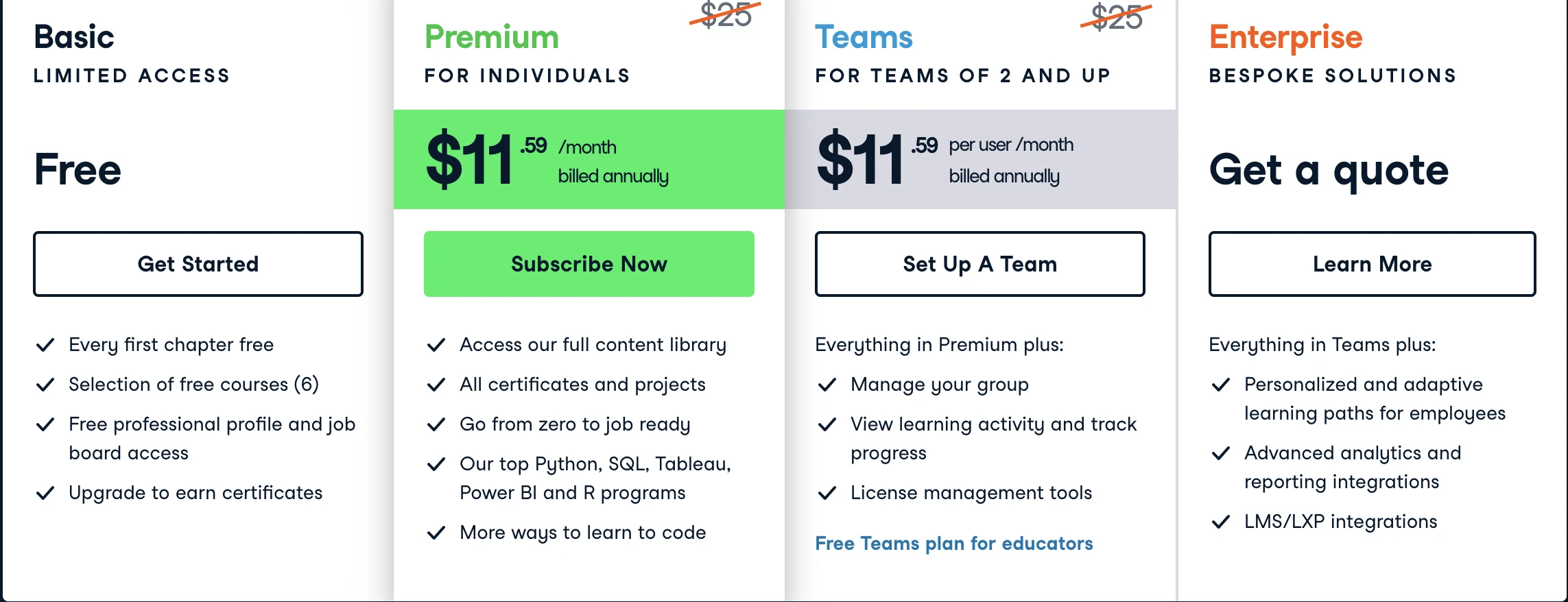
Like Udacity, anyone who creates an account has access to a library of free courses, which I appreciate, but it’s pretty limited compared to Udacity. There are a mere 6 free Datacamp courses. Outside of those free courses, Datacamp gives you monthly plans for full access to all of their courses.
Luckily, the cost is very low, at just $11.59 a month (annual billing) for individual users and teams or $139 per year on promotion.
There is a list of individual courses and career tracks. Career tracks group together several courses so that you can take them in a sequence, but they don’t build upon each other quite as clearly as nano degrees.
Winner: Draw
You probably expected me to declare Datacamp the winner. There’s no denying it’s far cheaper than Udacity. But Udacity also offers 200 vs 6 free courses.
In addition, I like the different ways you can take courses through Udacity. The nano degree programs provide a more comprehensive and integrated way to study.
Course Offerings
Udacity and Datacamp have a similar focus — but just how similar are they? Perhaps the most important differences are how these courses are packaged. Though they’re close competitors, how you take courses has a different feel on Udacity vs Datacamp.
Udacity
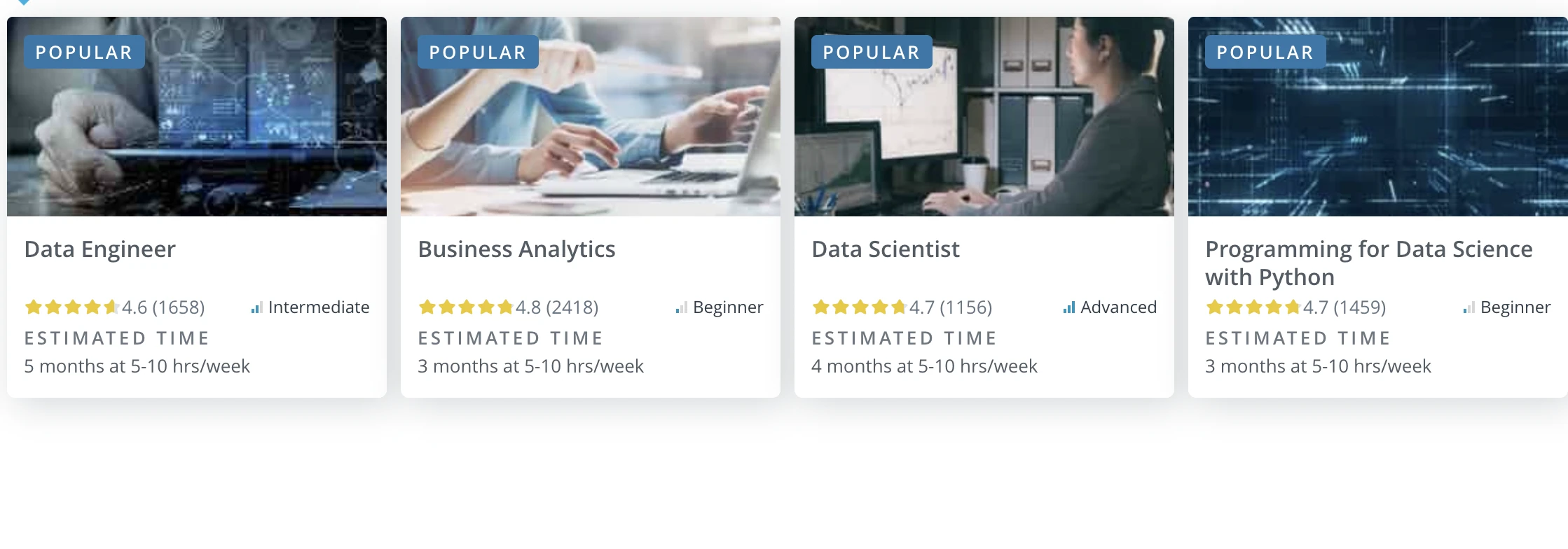
Udacity divides its courses and nano degrees into ‘schools’ or main disciplines.
These include:
- Artificial intelligence
- Autonomous systems
- Business
- Cloud computing
- Cyber security
- Data science
- Product management
- Programming development
Their most popular courses right now are
- Blockchain courses
- Business analytics
- Product management
- Programming for data science using Python.
When you browse their full catalog.
Master real, in-demand tech skills from home with Udacity’s 100% online learning platform. Stay ahead of the curve and get the skills you’ll need for the jobs of the future.
Datacamp
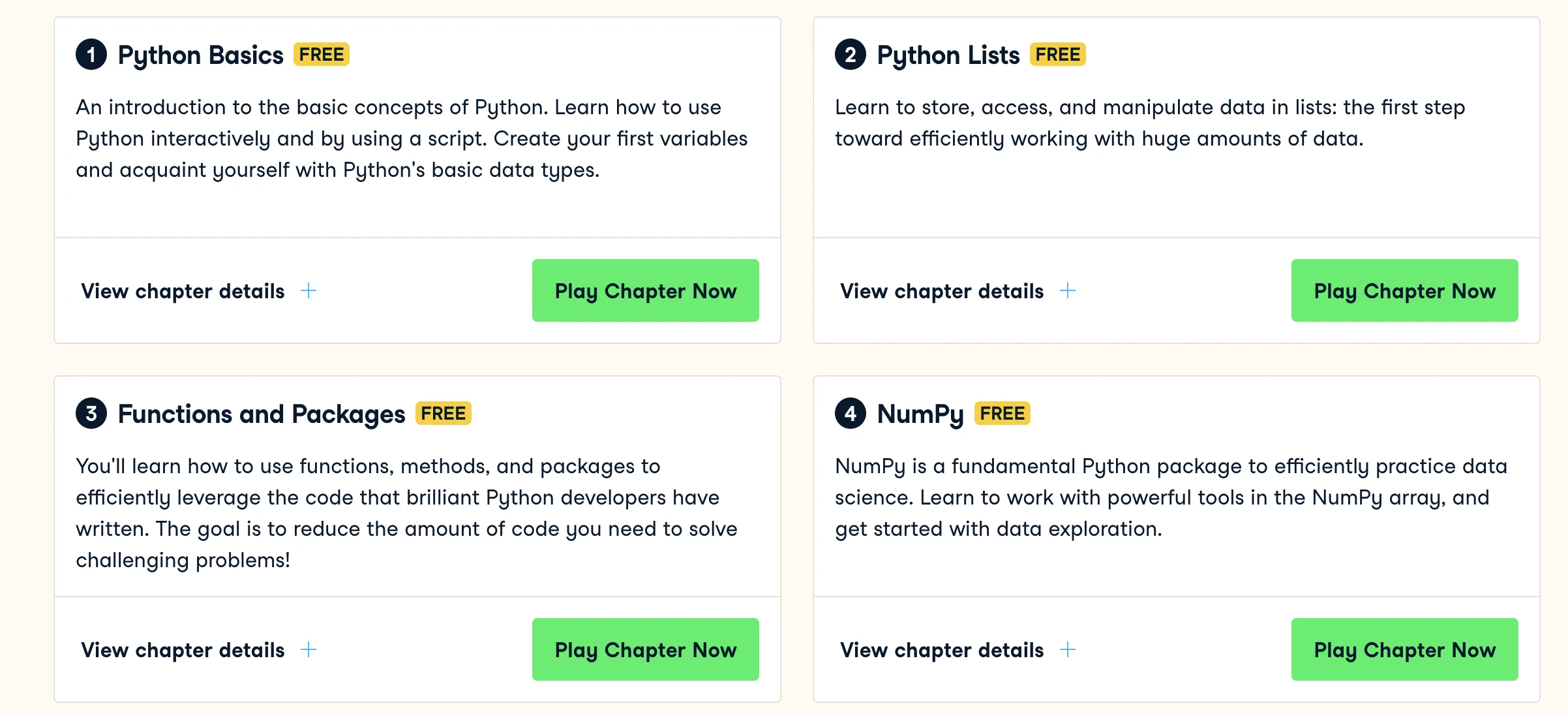
Datacamp provides 354 unique courses, 51 skill tracks, and 21 career tracks. Every course is in the field of data science and easily be searched for on their course catalog.
Main topics include:
- Probability and statistics
- Machine learning
- Programming
- Data manipulation
- Data visualization
- Applied finance
- Importing data
- Data engineering
- Reporting
- Management.
There’s a focus on common technology used for business, such as spreadsheets, Tableau, Power Bi, Scala, and Git.
Winner: Udacity
Both Udacity and Datacamp have an impressive category of IT and data science courses, but the focus is a little different. Udacity’s course catalog has a slightly broader reach, while Datacamp focuses just a little more on smaller niches.
I prefer the organization of the nano degree programs vs the career or skill tracks from Udacity because the course content flows seamlessly together. But in this area, it’s very close to a tie.
Main Course Features
It’s one thing to offer a course in a tech or data science field. It’s another thing to come out with an immersive, enjoyable, and thought-provoking experience. The truth is, online courses never fully replace an in-personal learning experience.
But what they can do is provide engaging content. For both Udacity and Datacamp, I wanted to see a variety of delivery methods (video, interactive lessons, etc), as well as hands-on practice and experience.
Also important: organized classes. Since student support is really important, I’m including this as a separate comparison.
Udacity
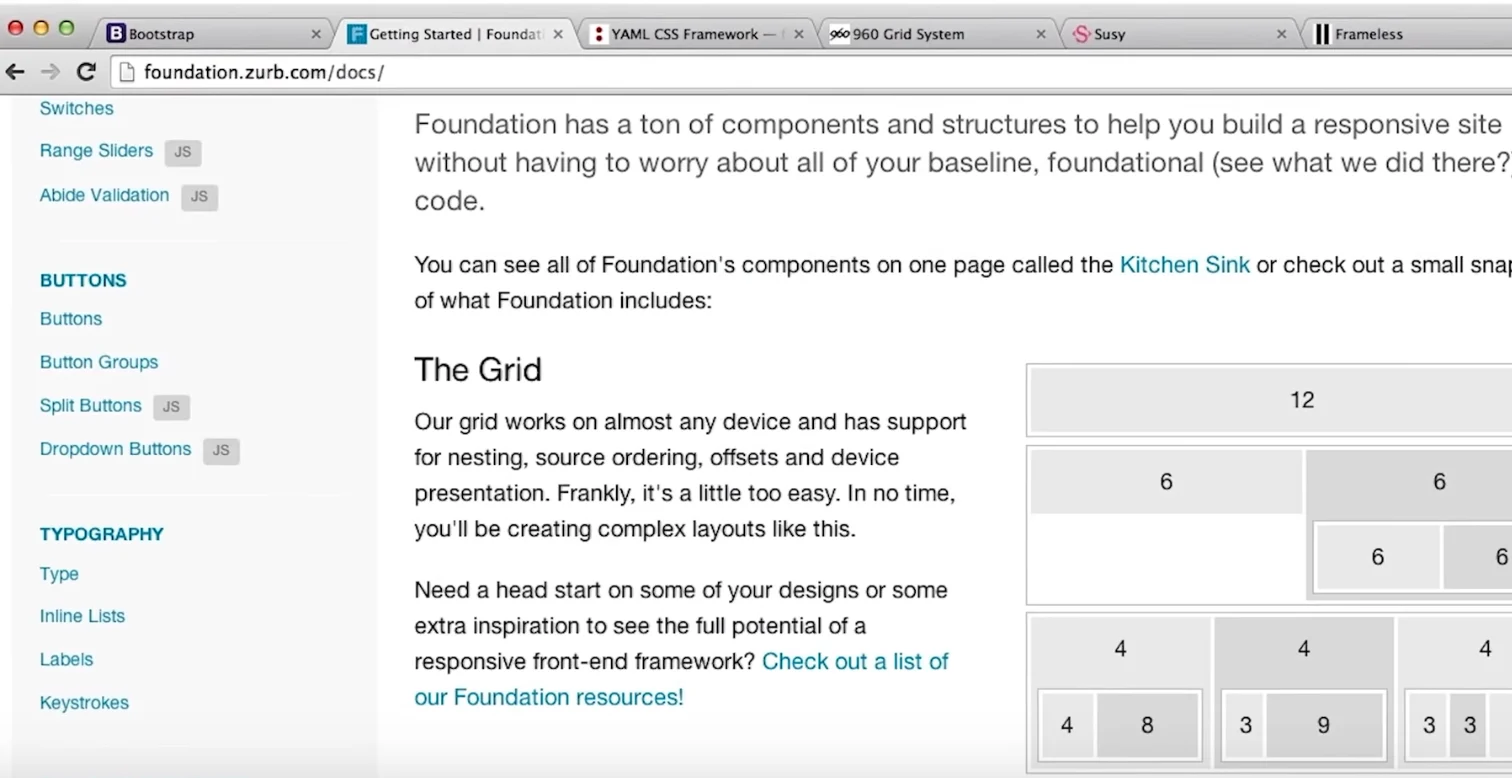
Udacity courses and nano degrees are all self-paced. That’s a great option for anyone with a busy schedule, but since you’re paying monthly, you also may feel pressured to complete the course. In a nano degree, there are a few modules (an average of 3 to 4), and each unit has its project. These projects take the skills you learned in that unit with scenarios that show how this information would be used in a real-world context.
All students receive personal feedback on their projects. Those projects are also developed with industry partners, and they’re my favorite part of Udacity’s platform. Learning tech skills is one thing– it’s another to be able to directly apply them.
The video instruction and course materials are pretty well-designed. The production standard is well-designed, and the instructors are experts in their industry. If you like the self-paced learning module, these courses are organized and pleasant to progress through. Some courses could go into greater depth, but the content flows well together.
One concern is how quickly Udacity keeps up with new technologies- and that’s a concern I’ve seen with many tech platforms. Udacity is pretty strong for evergreen content, just check each course to see what tech you’ll be working with.
Datacamp
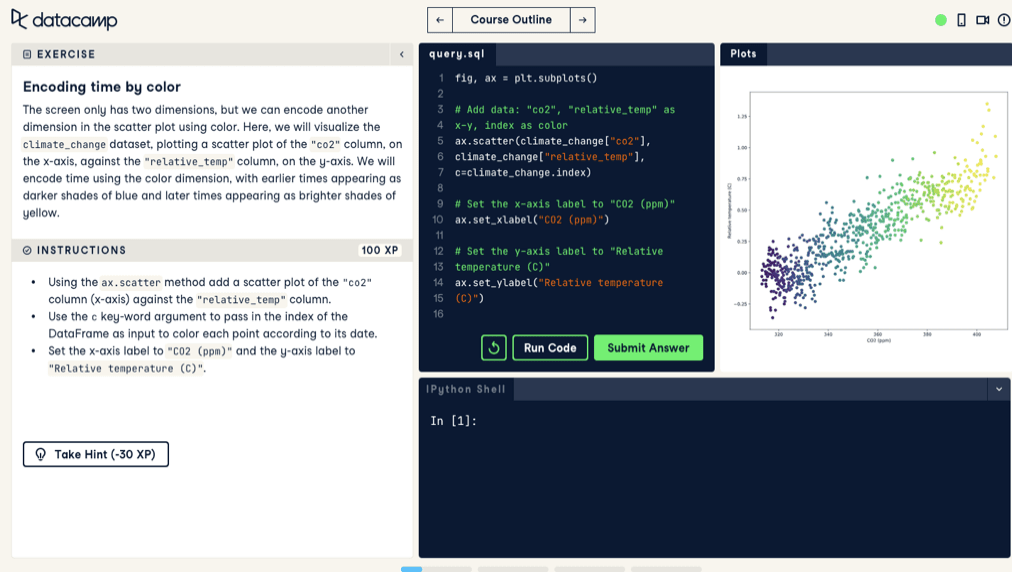
Datacamp provides instruction through bite-sized, interactive video lessons. You get practice directly applying your skills, such as entering code. The interface is pretty much what you’d expect, and, since you aren’t signing up for one program, it’s more of a free-form, a la carte style.
On the downside, courses tend to overlap each other and it can be a little overwhelming. I do like the hands-on practice, and some will enjoy how the platform awards you points depending on your answers.
They have projects to choose from, but you’ll need to look for those projects separately. All projects contain guided steps. Your project is automatically scanned for accuracy, and you can ask for automated hints. The projects are fairly straightforward for basic skills.
There’s a bit more text-based instruction, and, like Udacity, there’s a range of instructors from the industry. I also need to mention that often the focus is on the syntax vs a full implementation.
Winner: Udacity
Udacity courses are a bit less text-based, more immersive, and a bit more advanced. I also prefer Udacity’s personalized project feedback vs automated feedback.
Refunds and Student Support
At a bare minimum, there should be an easy way to contact customer support. I also wanted to see personalized attention and tech support.
I checked external ratings to get a clear picture of Udacity vs Datacamp. That’s where the comparison became interesting.
Udacity
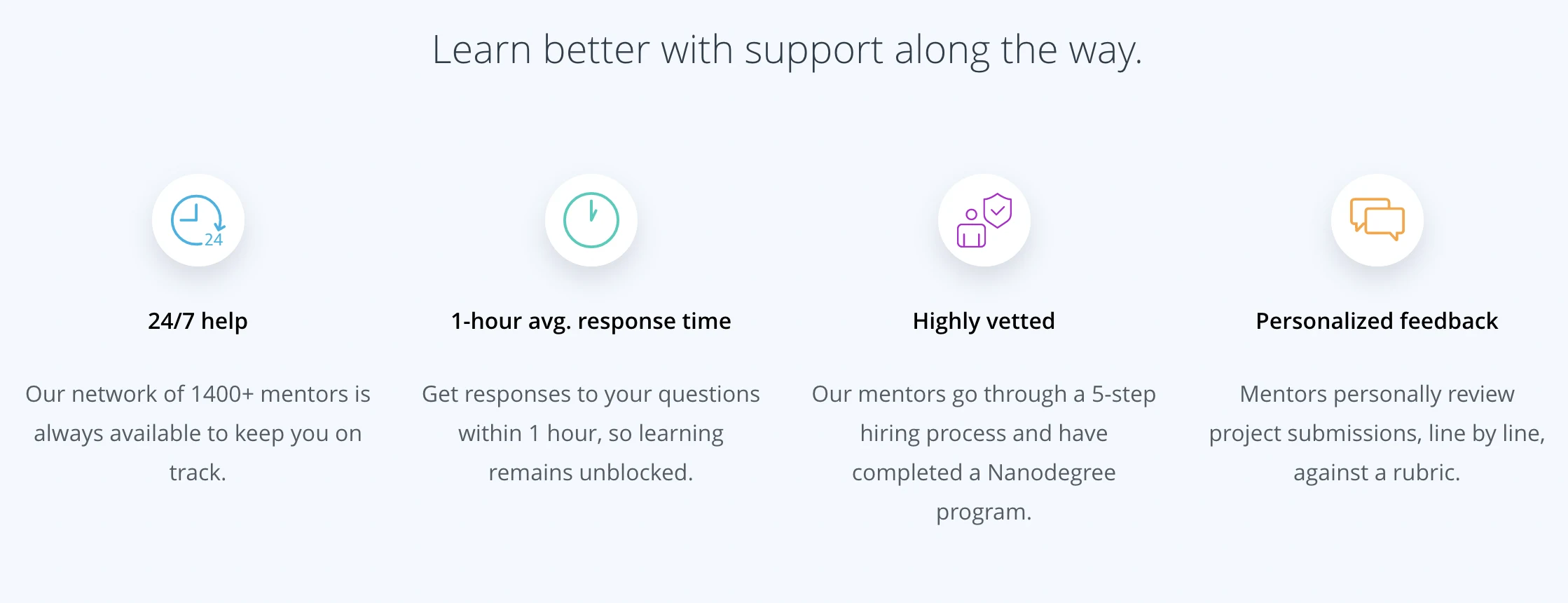
Udacity offers personalized feedback, but also career services. Those career services include a review of your LinkedIn profile or Github profile. They also provide student community forums and tech support. I think these are all great features. The downside is that the refund policy isn’t too generous. According to the Refund and Cancellation Policy, you have only 2 days to change your mind. A lot of platforms give you 7 days, so I’d love to see that expanded in the future.
You can cancel a monthly subscription by logging into your account. Keep in mind that it automatically renews if you don’t cancel.
Those issues represent most of the student’s concerns with learning from Udacity. Luckily, Udacity looks like they have a high response rate for any complaints. Aside from those complaints, average ratings indicate that students are fairly happy with the course content itself.
Datacamp
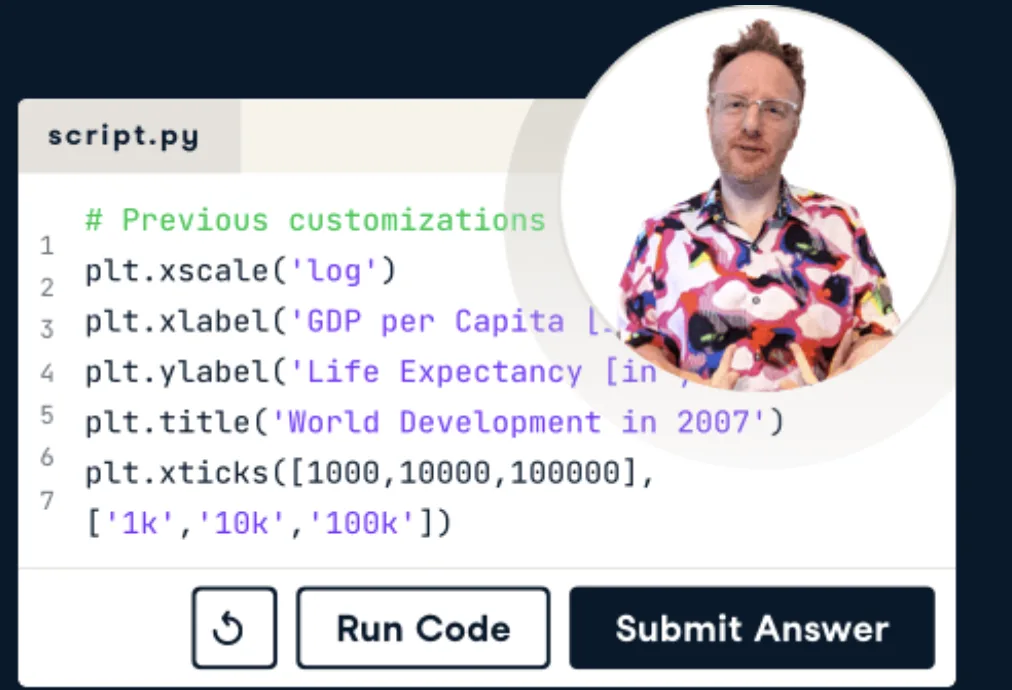
Datacamp has some great resources for all students, including white papers, case studies, and links to e-books and upcoming events. They offer discounts and promos in certain circumstances.
Datacamp doesn’t offer refunds. When you sign up, you may cancel for the next month, but everything automatically renews, unless you opt-out of auto-billing.
Average reviews for Datacamp– outside of BBB– are not too different from Udacity. Many students truly enjoyed their experience. However, while Udacity has a B- rating on Better Business Bureau, Datacamp has an F rating. The difference is that Datacamp appears to be less effective or diligent than Udacity at responding to filed complaints.
Winner: Udacity
Udacity provides more robust support. That includes an online student community, tech support, and career support. Udacity also is superior to Datacamp in its complaints response. I will say again that I think Udacity should consider a slightly larger refund window.
Frequently Asked Questions
Answer: Datacamp certification is informal. They can be used on a resume, but they aren’t the same as a professional certification or a degree program. These certifications are usually recognized by tech companies, but I do not believe that Datacamp is worth what you pay. Not only is it expensive, but there are superior alternatives, like Udacity.
The content could be more detailed, and there are more complaints than some alternatives. Of course, you need to decide what’s most important to you in an online learning environment.
Answer: Udacity is a company that offers online certification in high-demand fields like information technology, business, and data science. Their nano degrees are not university-accredited, but they are legit in other ways. The curriculum is impressive, you’re taught by industry experts, and you can place Udacity under your educational background on your resume. So while Udacity is not a professionally accredited program, it still can be useful for job prospects.
Answer: While nano degree programs are the main draw for Udacity students, there are many free courses as well. There are over 200 courses, including AWS Machine Learning Foundations, Intro to Python Programming, Developing Android Apps with Kotlin, Intro to Data Structures and Algorithms, Intro to Machine Learning, Intro to Deep Learning, and more.
While you can take as many free Udacity courses as you want, they do require registration on the platform. These courses aren’t as detailed as nano degrees, but they’re a solid resource.
Answer: Datacamp offers courses only in STEM fields, while Coursera has online degrees, certifications, and courses in a wide range of disciplines. Both Coursera and Datacamp offer video lectures and self-paced learning, but Datacamp beats out Coursera in several ways. Datacamp isn’t my top choice for online certification, but I do think it’s a better option than Coursera.
If you’re interested in learning more about the differences, check out my review of Datacamp vs Coursera here. My review explains both platforms in detail and recommends alternative courses.
Final Verdict: Udacity is the Better Option
While Udacity and Datacamp appear to be similar platforms, Udacity offers a better experience. You pay a lot more for it, but you’re getting instruction that’s more nuanced, organized, and immersive. Their student support is superior, and they have more unique course options. Sign up for Udacity Here.
Master real, in-demand tech skills from home with Udacity’s 100% online learning platform. Stay ahead of the curve and get the skills you’ll need for the jobs of the future.
Final Recommendations: Udacity Alternatives (University- Affiliated)
If you’re itching to try some coding, data science or IT courses but want to compare your options, there are a few alternative platforms. These include other self-paced, open enrollment courses but also professional certifications and degree programs. If you want something beyond certification of completion or to enhance it, here are a few options.
Data Science Bootcamps and Courses Ohio State, MIT

Ohio State University offers a Data Science Bootcamp that lasts 24 weeks that provides hands-on projects, flexible scheduling, and portfolio projects.
MIT has a 12-week Data Science Course that teaches Python, Deep Learning, Data Visualization, Machine Learning, Neural Networks, and more. You’ll get live virtual sessions by MIT faculty, mentorship, and work towards a captain project.
Data Science Courses from Harvard University
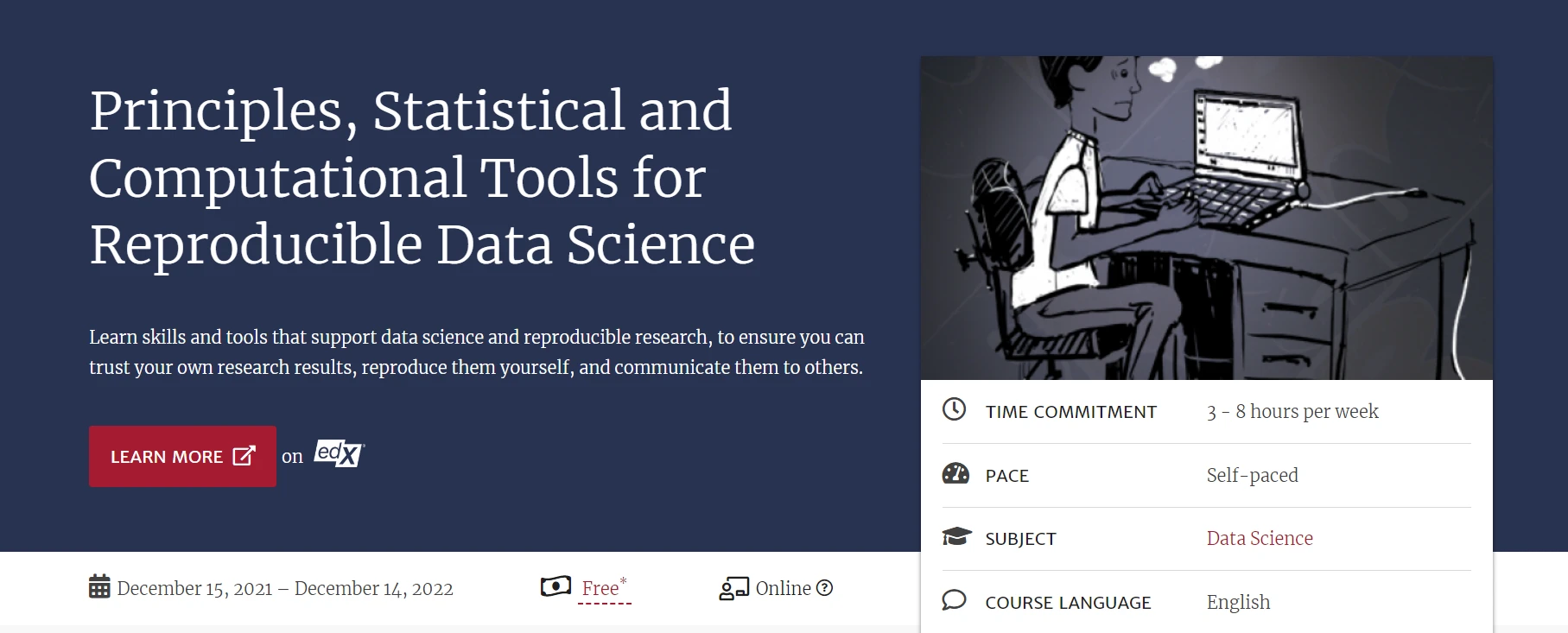
Harvard University offers online courses in data science, open to the public. The catalog of online courses includes Computational Tools for Data Science, Machine Learning, Linear Regression, and so much more.
Some of these courses cost money — but others, such as the linear regression course, are entirely free! Courses come with a professional certification once you finish and last anywhere from 2 weeks to 8 weeks. Browse the Catalog Here.


